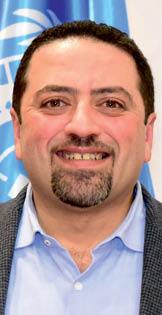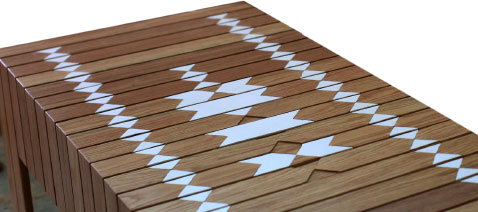Establishing a solid design culture is an essential strategic asset for any country that aims to foster inclusive and sustainable economic development for generations to come. Despite being often misinterpreted as a mere decorative activity whose impact doesn’t go beyond the appealing restyling of a product or a fashionable item, design has proven to be a much wider and effective leverage opportunity to stimulate growth in any type of industry, as acknowledged by worldwide academia, economists, and grassroots design initiatives. In this scenario, the kind of creativity that design instills plays a fundamental role not only in identifying new potential businesses, fostering entrepreneurial cooperation, or giving shape to a new generation of engaging goods, but also in unlocking the potential of human capital and offering a tool for development and resilience that can build ties and strengthen our communities.
Founded in 2015 in Ramallah, Creative Palestine is a network that connects designers and entrepreneurs with various institutions such as art and design foundations, universities, and art and design NGOs, forming a common creative think tank and laboratory that is open to participation and collective collaboration. Established under the impulse of United Nations Industrial Development Organization (UNIDO), Creative Palestine has been funded by the European Union together with an additional contribution from the Italian Development Cooperation Agency (AICS) under the umbrella of “Creative Mediterranean,” a regional development program that, during the course of two years, has built cluster-based networks within the local creative industries of seven MENA (Middle East North Africa) countries.
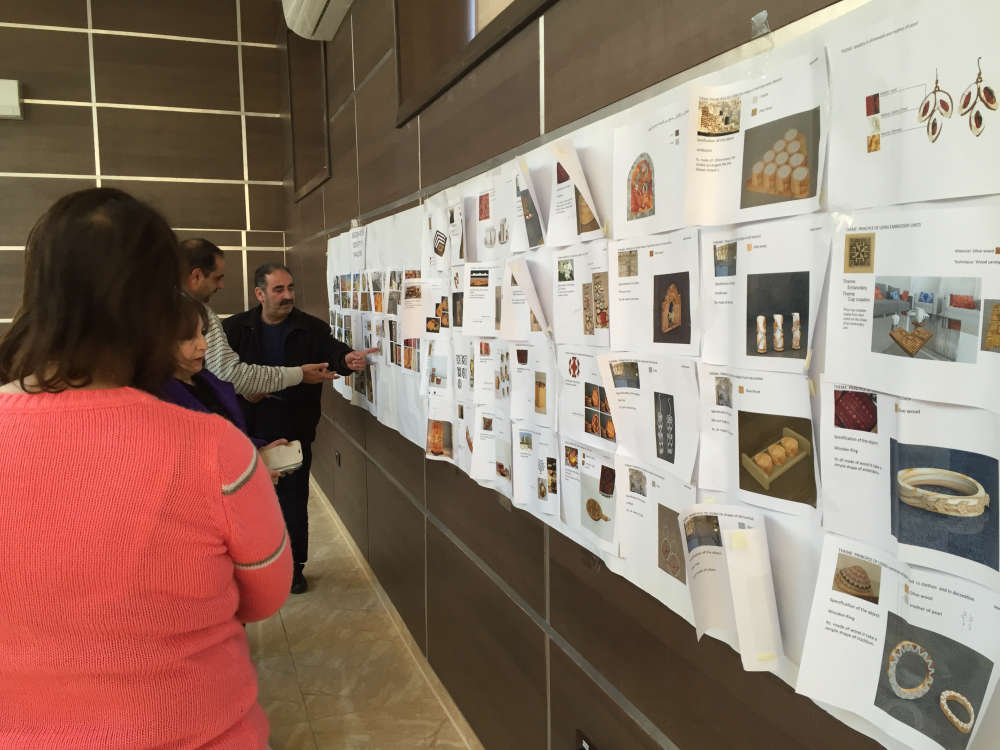
In Palestine, thanks to the vision and support of the local chambers of commerce and industry in Nablus and Bethlehem, the traditional handicrafts cluster in Bethlehem and the furniture cluster in Nablus were selected – from among several industrial sectors that competed in a call for proposals launched in partnership with the Ministry of National Economy – to be the beneficiaries of the program’s focused technical assistance. Both clusters have promising assets: the Bethlehem Treasures Cluster gathers specialized producers of handicrafts, decorations, and souvenirs – most of them self-employed women – who work in the Bethlehem area, continuing the long tradition of olive wood carving and mother of pearl manufacturing, which dates back to the sixteenth century. The Nablus Furniture Cluster gathers over 25 companies that are located in the natural furniture hub of Nablus. Their bespoke solutions, specialized in woodworking and upholstery projects, merge craftmanship with the chance to scale their productivity to industrial level.
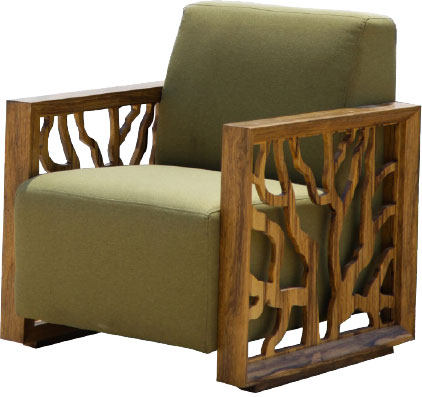
To set up from scratch a design-based entrepreneurial culture is not the type of assignment that can be underestimated, nor can it generate impact quickly and without efforts – neither, we should frankly admit, can it be achieved without the risk of falling apart along the way. If complexity and hurdles are inextricable components of any effort for change, establishing a new, design-based ecosystem in Palestine poses an even greater challenge. Despite the presence of talented and visionary Palestinian designers who carry out their research with commitment and, in most cases, significant results, the absence of recognized design and product-development schools and supporting institutions turns into a general scarcity of available and prepared professionals.
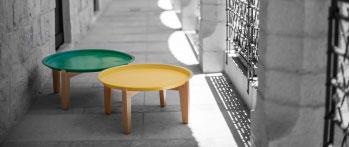
Limitations of movement due to the Israeli occupation restrict the opportunity for exposure to foreign trends and benchmarks, and suffocate the inspiration process. For the same reason, the availability and prices of raw materials can be higher than expected, while import and export operations can be slowed down by the impossibility to control Palestine’s borders. Whereas local entrepreneurs frequently look with interest to the potential that design interventions might disclose, they hesitate to invest their own financial resources to collaborate with designers or to brand their own company, preferring to work as subcontractors. And the presence of many small businesses, often micro-companies with limited financial resources, is not making this scenario evolve faster.
To overcome these restraints, Creative Palestine has followed a systematic methodology that aims to contain risks and maximize the highest potentials of its beneficiaries. At the inception of the project, local and international markets were investigated by program experts who highlighted new trends and promising demands for both the handicraft and furniture sectors. Training initiatives and workshop sessions were then offered to local entrepreneurs and designers with the objective not only of reinforcing each participant’s expertise but also of creating a positive impact on the whole ecosystem through the perspective of shared, collective collaboration and empowerment. This new format, an environment that according to Creative Palestine is the key to fostering engagement and sharing, has been called “Design Hub.” Not yet a physical hub that is open every day – at least until now – it has presented a series of design sessions dedicated to the development of new design ideas and their translation into creative products.
But how does its synergic approach concretely take place? Let’s answer with a practical example. Having benefitted from the training offered by international and local experts in a Design Hub session, a young designer can share with the other participants her/his fresh ideas and sketches, together with as-yet unexplored ways to transform them into a new product. Workshop participants are then invited to express their feedback, thus offering an important platform for questioning and refining this very initial prototype. Furthermore, an experienced craftsperson may suggest to the designer a technical solution that enhances the product’s feasibility, while a business angel can identify the correct way to introduce this new product to selected potential targets, contributing to the establishment of competitive pricing and proper communication. Within such a framework, differing energies and backgrounds are naturally funneled into effective solutions, while collaboration between partners spontaneously leads to a horizontal, open, and interdisciplinary environment.
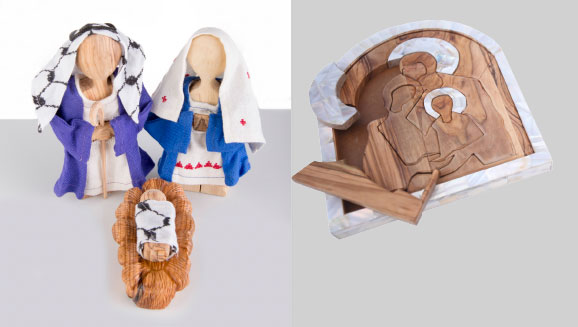
Open source project by Design Hub Palestine UNIDO. Photo credit: UNIDO Palestine.
In any of Creative Palestine’s initiatives, the question of national identity remains crucial throughout the whole design process. None of the furniture or objects that were conceived within the coaching program were intended to be a cheap imitation of a foreign model. On the contrary, UNIDO’s approach has always insisted on developing each new collection according to the distinctive idea of space and identity that defines Palestinian culture. Heritage, especially in the case of Palestine’s ancient and layered culture, is an incredibly rich yet often superficially exploited archive that needs to be explored, analyzed, and reinvented. The problem is first of all how to make it accessible: that’s why research has been conducted about the clusters’ “common story,” a territorial brand analysis has been done, and an image database of Palestinian landmarks, people, and artifacts has been created. In addition, discussions have been held with all the clusters’ members and engaged designers, so that they could be inspired by this amazing variety of values, shapes, and techniques. The aim, however, has never been to dwell on the past, but on the contrary, to propose new, vibrant interpretations of these old memes. Creative Palestine’s objects are neither copies nor re-propositions from a nostalgic era; rather they are meant to speak to our time and to endure. Original and authentic, they privilege the use of local, natural materials and handmade techniques, encouraging a passion for quality and a more sophisticated demand.
Cultural and creative industries transform cultural and creative inputs into goods and services that embody both cultural and economic values.
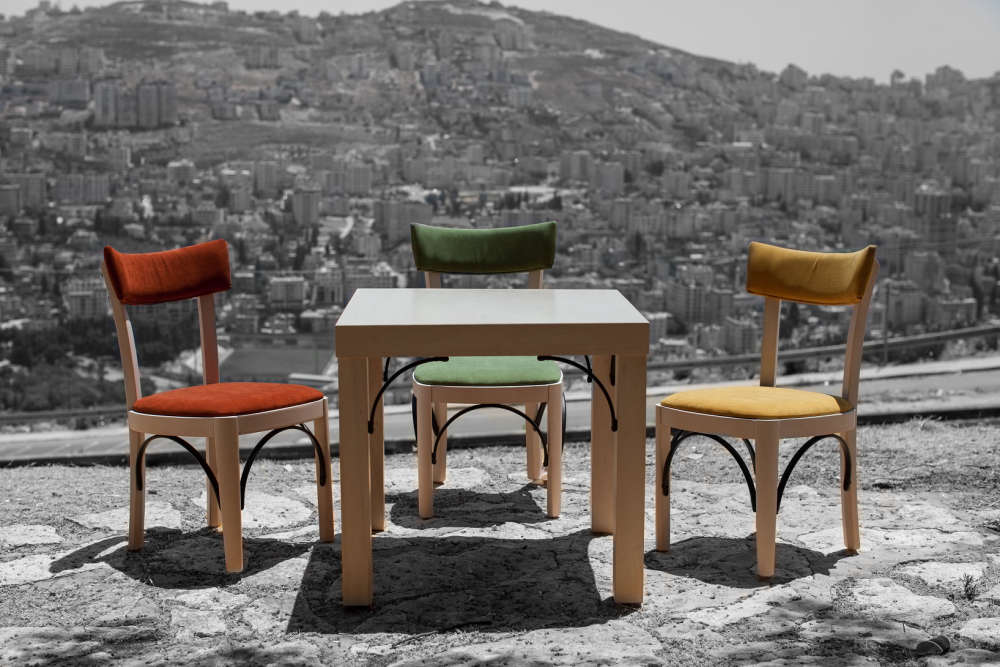
However, the development of new designs or products is not limited to brand new collections for the consumer market but also looks at the contracting sector as a good business opportunity that can also highlight the high craftsmanship value of Palestinian workshops. In June 2017, for example, the Nablus Furniture Cluster conceived and crafted a personalized collection of furniture for the new tourist accommodation inaugurated in the old Khan al-Wakalah caravanserai in Nablus. A coordinated set of seats, tables, and beds, together with custom-made furnishings for the common areas, the Khan al-Wakalah Collection has transformed this ancient caravanserai through an unprecedented mixture of contemporary style infused with a touch of Palestinian, minimalist flair to meet the expectations of both tourists and locals.
Beyond the creative design and product-development aspects, Creative Palestine’s initiatives have enhanced the companies’ competitiveness in local markets and export potentials through the development of clusters, technical upgrading, business-development missions, and coaching on the latest product trends. In November 2016, the craftspeople from the Bethlehem Treasures Cluster had the chance to sell their handmade decorations and souvenirs in two Christmas markets in Vienna, opening up to the European market and, thanks to a parallel business mission organized by UNIDO, establishing new commercial relationships with local buyers and wholesale resellers. A study tour to Italy was then organized in 2017 to expose a delegation from the Nablus Furniture Cluster to the latest furniture productions showcased at the Salone del Mobile in Milan, the biggest international tradeshow in the furniture sector. The trip also included visits to several furniture-equipment producers, also located in Italy, in order to identify the best equipment to be integrated into the companies’ existing machinery. In April 2018, a delegation of the Nablus Furniture Cluster conducted a new business mission that included meeting several buyers and business partners in Kuwait and the United Arab Emirates with further support from Palestine Market Development Program (PMDP): an important opportunity to expand the “natural” boundaries of Palestine’s major export market, Israel, and to find new opportunities for trade and expansion. In order to present themselves as a reliable partner, the clusters and the collections themselves have been branded through a bespoke visual identity and communication activities that aim to highlight the uniqueness and the competitiveness of Palestinian production in the creative sector.
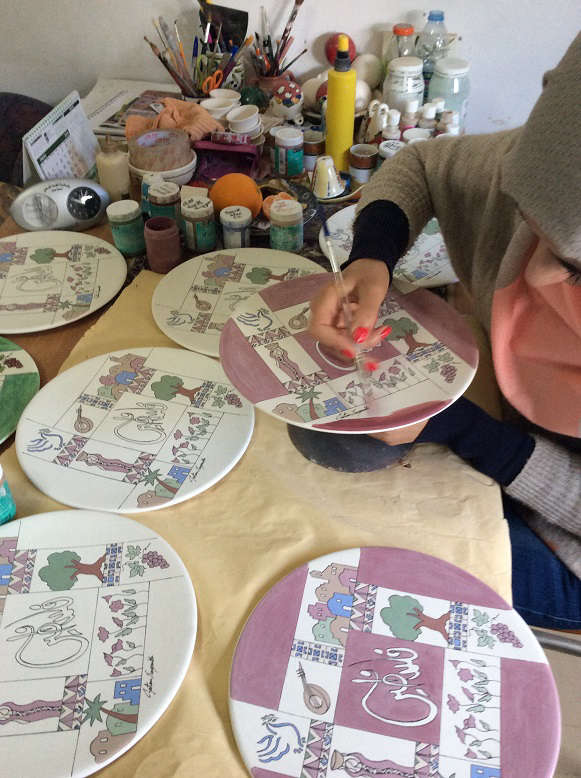
To establish a proper design culture and to see the benefits of its influence is not a short-term program that can be accomplished quickly. Thus, the mission of Creative Palestine has not yet ended. Sustainability is one of the most important aspects to be kept in mind throughout the process; more initiatives are being implemented to guarantee that the development of a new, design-oriented attitude in Palestine is not restricted to the existing clusters but can expand and circulate throughout the country, generating profits for various productive sectors. Creative Palestine’s mission is currently in the process of being extended with direct support from the Italian Development Cooperation Agency (AICS) to the Footwear Cluster in Hebron, which will benefit from the design and implementation of new footwear collections, new access to market activities, together with the provision of targeted technical assistance and marketing support. Similar initiatives for the textile sectors in Jenin and in the Gaza Strip are about to be put in place, with more sectors becoming interested in the approach and keen to focus on its development at the wider national level. Given this trending growth, the presence of a physical Creative Design Hub is more and more needed to systematize the design effort and make its expertise available to multiple partners. Creative Palestine is currently working on its establishment, a key effort – we believe – to disclose the potential that Palestinian creative industries still have to express.

